Looking for the ultimate browsing experience on Linux? Look no further than finding the best browser for Linux! In the vast sea of options, discerning the best browser for Linux Mint, the best browser for Linux 32 bit, the best browser for Linux Fedora, or even the best browser for Linux Debian can be a quest. Yet, in the evolving landscape of 2023, the pursuit for the best browser for Linux OS has never been more critical. Whether navigating the sleek interface of Linux Mint or delving into the versatility of Arch Linux, discovering the safest web browser for Linux becomes an essential pursuit for safeguarding your online ventures.
Picture this: a seamless blend of performance, security, and compatibility is the hallmark of the best browser for Linux. From the sleek, user-friendly interface of Linux Mint 32 bit to the robustness demanded by Fedora or Debian, the best browser for Linux 2023 transcends mere utility—it becomes a conduit to a secure, efficient browsing experience. Embracing the ethos of open-source platforms like Arch Linux, discerning what's the best browser for Linux becomes an exploration of innovation and reliability. Amidst this tech-savvy terrain, the quest for the best browser for Linux becomes not just a preference but a necessity—an indispensable tool in navigating the ever-expanding digital universe. In this Article we tell you which browser has the best performance for Linux, best file browser for linux, and what browsers work on linux.
If you're new to Linux or looking to expand your knowledge, check out our guide on What is Linux? to understand the fundamentals of this powerful operating system.
What is Linux?
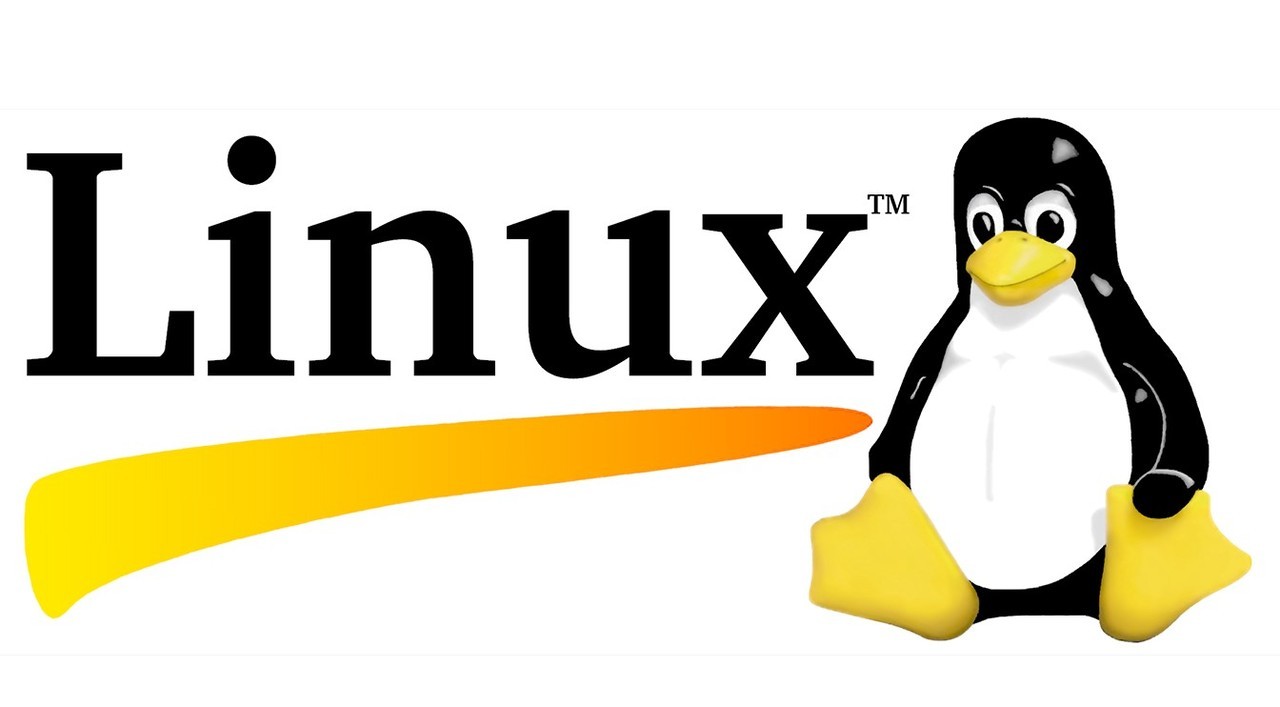
In this section we teach whats the best browser for linux, what is the best linux distribution for web browser Linux is an open-source operating system renowned for its robustness, security, and flexibility. It serves as a backbone for a multitude of devices, from servers to personal computers, offering a diverse array of distributions catering to various user needs, such as Linux Mint, Arch Linux, and many others. At the heart of this operating system lies the quest for the best browser for Linux, the gateway to the vast digital landscape.
In the realm of Linux, compatibility reigns supreme, especially when considering hardware diversity, as evidenced by the search for the best browser for Linux 32 bit systems. Whether navigating the sleek interface of Linux Mint 32 bit or embracing the customizable nature of Arch Linux, the question of what's the best browser for Linux persists. Yet, the best browser for Linux OS isn't solely about functionality; it encompasses security and adaptability, vital elements in the digital era. The safest web browser for Linux acts as a fortress against online vulnerabilities, a critical feature when exploring the interconnected web on a Linux-based system. Amidst this diverse ecosystem, pinpointing the best browser for Arch Linux or discovering the best browser for Linux Mint becomes pivotal in tailoring one's Linux experience.To learn how to work with Linux, refer to the article How to use Linux.
Why Choose Custom Browsers for Linux?
Befor Choosingbest browser for linux ubuntu, you should know Why Choose Custom Browsers for Linux. Opting for custom browsers on Linux unveils a world of tailored experiences and specialized functionalities, making the choice of the best browser for Linux a pivotal one. It's not merely about accessing the web; it's about personalization, efficiency, and security. Seeking the best browser for Linux Mint 32 bit, for instance, isn't just about compatibility but also about optimizing performance on specific hardware configurations. The quest for what's the best browser for Linux becomes an exploration of a plethora of features catering to distinct user needs.
The allure lies not only in finding the fastest browser for Linux but also in seeking the most secure browser for Linux, especially in an age where online safety is paramount. Custom browsers offer a range of security features, from robust encryption to enhanced privacy settings, ensuring a safer online journey. Moreover, when considering factors like battery life, the best browser for Linux becomes an essential choice, as it can significantly impact the longevity of portable devices. Delving into options like the best browser app for Linux Mint reveals a world where user preferences and system optimization merge seamlessly.
Amidst the options, the allure of Chromium-based browsers for Linux often surfaces in discussions across platforms like Reddit. These browsers blend the acclaimed performance of Chromium with Linux's flexibility, offering a diverse range of features and extensions. The versatility and adaptability of these browsers make them a prime choice, enhancing the overall browsing experience on the Linux platform. In next section you can know key factors to choosing linux best browser. For more information on how Linux can be utilized, check out our guide on What is Linux used for?.
Key Features to Consider when Choose Custom Browsers for Linux
In this section we tell you Key Features to Consider when best browser in linux, and best internet browser for linux:
1. Performance and Compatibility
Selecting the best browser for Linux, and best 32 bit browser for linux involves evaluating its performance across different distributions and hardware configurations. Whether you're seeking the best 32-bit browser for Linux or aiming for optimized performance on Linux Mint, compatibility becomes paramount. Additionally, exploring the realm of Chromium-based browsers for Linux, like the best Chromium browser for Linux, often provides a seamless blend of performance and adaptability, enhancing the overall browsing experience.
2. Security and Privacy Measures
Prioritizing online security is essential, especially in today's cyber landscape. The quest for the most secure browser for Linux leads to browsers equipped with robust encryption, advanced privacy settings, and frequent security updates. For users seeking enhanced privacy features, delving into the best browser app for Linux Mint might uncover tailored solutions offering heightened protection against online threats.
3. Battery Life Optimization
In the pursuit of the best browser for Linux, considerations extend beyond performance and security to factors like battery life. An efficient browser can significantly impact the longevity of portable devices running on Linux. Exploring best browser for battery life linux becomes crucial for users who prioritize prolonged usage without compromising performance.
4. Community Recommendations and Compatibility
Linux users often rely on community insights, such as discussions on platforms like Reddit, to unearth the best Chromium-based browser for Linux or to seek advice on what's the best browser for Linux. While Google Chrome might not be directly available for all Linux distributions, exploring Chromium-based alternatives optimized for Linux ensures compatibility and functionality.
5. Specialized Browsing Needs
For users seeking specialized browsing experiences, investigating the best Linux distro for the Tor browser might be key. These distributions are tailored to prioritize anonymity and security, catering to users navigating sensitive or highly private online activities.
When considering custom browsers for Linux, weighing these features—performance, security, compatibility, battery optimization, community feedback, and specialized needs—empowers users to make an informed choice, aligning their browsing experience with personal preferences and system requirements.To learn about the important features of Linux, you can also read the article Linux Features that everyone should know! In next parts you can know what is the best browser for linux mint, and best browser for kali linux:
1. Google Chrome Browser

In this section we tell does linux support google chrome, and best browser for low end pc linux. Google Chrome, while not directly available for all Linux distributions, remains a prominent player in the browsing sphere. Its reputation for speed, sleek interface, and robust performance across various platforms makes users often wonder: "Is Chrome available for Linux?" While there isn't an official Chrome version for all distributions, Chromium, its open-source counterpart, serves as the foundation for numerous browsers optimized for Linux, making it the best chromium-based browser for Linux in many cases.To learn about the best Linux editor on different platforms, refer to the article Best text editors for Windows, Mac and Linux.
Advantages and Features
The chrome is best lightweight browser for linux, best lightweight browser for linux reddit, and best lightweight browser for linux mint. The allure of Chrome lies in its seamless integration with Google services and an extensive library of extensions, enhancing functionality and productivity. Known for its stability and speed, users often consider Chrome as the best browser for Linux due to its efficient performance and compatibility across different systems. Additionally, its synchronization feature enables seamless browsing across devices, syncing bookmarks, history, and preferences.
Suitability and Users
Chrome suits a wide spectrum of users, from casual internet surfers to power users, owing to its intuitive interface and wide array of functionalities. For Linux users seeking the most secure browser for Linux or exploring the best browser app for Linux Mint, Chromium-based browsers offer enhanced security features and compatibility tailored to the Linux environment.
Linux Compatibility and Alternatives
While Linux doesn't directly support Google Chrome, users can explore Chromium-based browsers optimized for Linux. These alternatives, often considered the best chromium browser for Linux, encompass various distributions, catering to different user preferences and system requirements. Moreover, users can leverage specialized Linux distributions like the best Linux distro for the Tor browser, prioritizing privacy and anonymity in their browsing experiences.
Google Chrome's absence as an official browser for all Linux distributions hasn't diminished its popularity,best web browser for linux lite, and best light browser for linux. Instead, its open-source counterpart, Chromium, fuels a multitude of browsers tailored for Linux, making it a versatile and viable choice for users seeking a robust and feature-rich browsing experience on the Linux platform.
Install Google Chrome on Linux
here's a detailed guide on installing Google Chrome on Linux and a highlight of the best browser for the platform.
To install Google Chrome on your Linux system, follow these steps:
Download Chrome Package:
- Visit the official Google Chrome website.
- Choose the appropriate package for your Linux distribution (e.g., .deb for Debian/Ubuntu, .rpm for Fedora/OpenSUSE).
- Download the package to your system.
Install the Package:
Use the package manager or terminal commands to install the downloaded package.
- For Debian/Ubuntu
- Use dpkg or apt to install the .deb package.
- · For Fedora/OpenSUSE
- Use dnf or zypper to install the .rpm package.
Launch Google Chrome
After installation, you can find Google Chrome in your applications menu or launch it from the terminal using the command google-chrome.
2. Firefox Browser
diving into Firefox for Linux, here's a comprehensive breakdown:
When it comes to the best browser for Linux, Firefox stands tall as a robust and versatile option, offering a range of advantages and features that cater to diverse user needs.
Advantages and features of Firefox on Linux:
Open Source Nature
Firefox's open-source nature appeals to users valuing transparency and community-driven development.
Privacy-Focused Features
Enhanced privacy settings, tracker blocking, and container tabs make it a favorite among privacy-conscious users.
Customization
Extensive customization options via add-ons and themes allow users to tailor their browsing experience to their preferences.
Performance
Firefox is known for its excellent performance, handling resource-intensive tasks smoothly.
Who is it suitable for?
Firefox on Linux is suitable for
Privacy Advocates
Who prioritize privacy-centric browsing features.
Customization Enthusiasts
Seeking extensive options to personalize their browsing experience.
Open-Source Enthusiasts
Valuing transparency and community-driven software.
Resource-Conscious Users
Appreciating a browser that performs well without excessive resource consumption.
Integrating Firefox into Linux
Installing Firefox on Linux is usually straightforward:
Package Manager
Use your distribution's package manager to install Firefox.
Firefox remains a best lite browser for linux, boasting privacy features, customization options, and strong performance. However, exploring alternatives based on individual preferences can lead to a tailored and satisfying browsing experience on the Linux platform.
Install Firefox on Linux
Installing Firefox on your Linux system is a simple process:
1. Package Manager Installation:
- Use your distribution's package manager to install Firefox.
- For Debian/Ubuntu: Execute sudo apt install firefox.
- For Fedora/OpenSUSE: Use sudo dnf install firefox or sudo zypper install firefox.
2. Direct Download Method:
- Visit the official Mozilla Firefox website.
- Download the Firefox package compatible with your Linux distribution.
- Follow the installation instructions provided on the website.
To optimize your Linux experience, it's essential to understand the basics of a Linux server. Check out our guide on What is a Linux Server for more insights on setting up and managing a server environment.
3. Opera Browser
let's dive into the Opera browser, highlighting its features, advantages, and suitability for Linux users:
Opera stands as a unique and feature-rich browser, offering a range of advantages that make it a compelling choice for Linux users seeking a distinct browsing experience.
Advantages and features of Opera on Linux:
Built-in Ad-Blocker
Opera comes equipped with an integrated ad-blocker, enhancing user experience by reducing clutter and improving page load times.
VPN Integration
Opera offers a free, built-in VPN, allowing users to browse securely and access region-restricted content.
Speed Dial and Customization
The Speed Dial feature provides quick access to favorite sites, while extensive customization options enable users to personalize their browsing interface.
Battery Saver Mode
Opera includes a battery-saving mode, particularly useful for users on laptops or devices concerned about power consumption.
Who is it suitable for?
Opera on Linux is suitable for:
Users Valuing Convenience
Appreciating features like the built-in ad-blocker and VPN for an all-in-one browsing experience.
Individuals Seeking Customization
Enjoying the flexibility to personalize their browsing interface and access favorite sites easily.
Privacy-Conscious Users
Finding the integrated VPN an attractive feature for secure browsing.
Opera presents itself as a compelling choice for Linux users, offering features like ad-blocking, VPN integration, and customization options. However, exploring alternative browsers based on individual preferences can lead to a tailored and satisfying browsing experience on the Linux platform.
Install Opera on Linux
Of course, let's navigate through the steps to install Opera on Linux and highlight its advantages, making it a prominent choice among browsers for Linux users.
To install Opera on your Linux system, follow these steps:
1. Visit Opera's Website:
- Go to the official Opera website and navigate to the download section.
- Select the Opera package compatible with your Linux distribution.
- Download the package to your system.
2. Installation via Terminal:
- Open the terminal.
- Use terminal commands like sudo dpkg -i opera_package.deb for Debian/Ubuntu or sudo rpm -i opera_package.rpm for Fedora/OpenSUSE to install the downloaded Opera package.
3. Package Manager Installation (Optional):
- Check if Opera is available in your distribution's package manager.
- Use commands like sudo apt install opera-stable for Debian/Ubuntu or sudo dnf install opera-stable for Fedora/OpenSUSE.
4. Vivaldi Browser
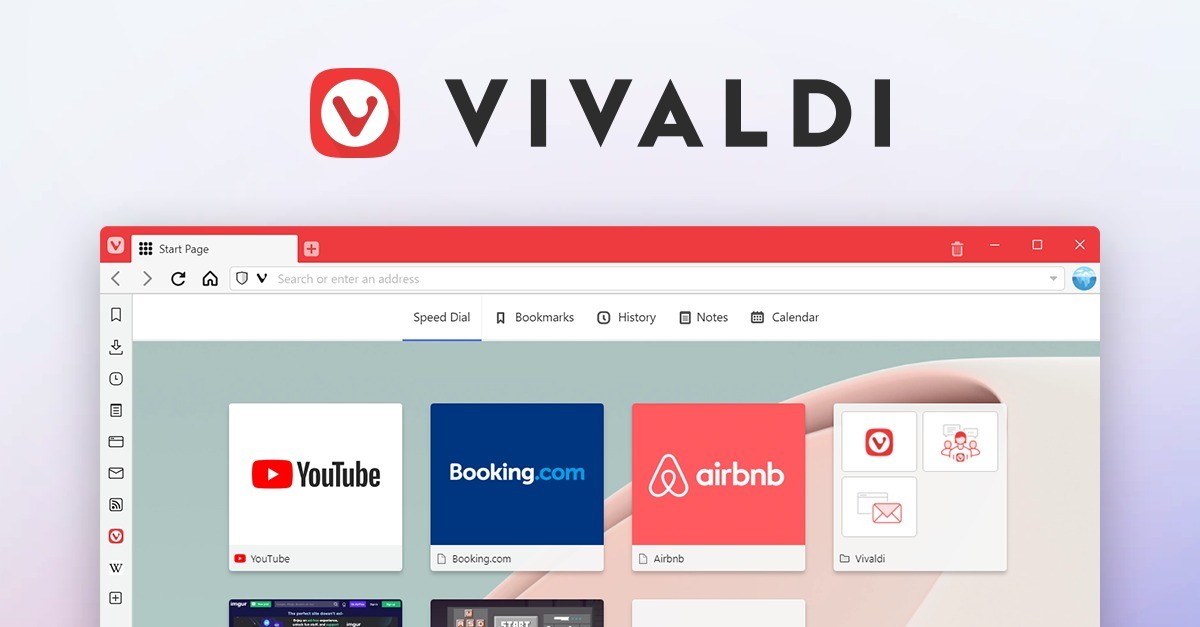
Vivaldi stands as an innovative and feature-rich browser, offering a range of advantages that cater to diverse user preferences on the Linux platform.
Advantages and features of Vivaldi on Linux:
Customization Galore
Vivaldi emphasizes extensive customization options, allowing users to tweak almost every aspect of their browsing experience, from themes to tab management.
Tab Stacking and Tilig
Vivaldi introduces tab stacking and tiling features, enabling users to organize and view multiple tabs efficiently.
Built-in Tools
Features like a note-taking panel, screenshot capture, and a built-in ad-blocker enhance productivity and convenience.
Privacy and Security
Vivaldi places a strong emphasis on user privacy, offering various privacy settings and features.
Who is it suitable for?
Vivaldi on Linux is suitable for
- Customization Enthusiasts
Who enjoy tailoring their browsing experience to suit their unique preferences.
- Power Users
Appreciating advanced features like tab stacking and a range of built-in tools for productivity.
- Privacy-Conscious Users
Valuing strong privacy settings and features offered by the browser.
Vivaldi emerges as a compelling choice for Linux users, offering extensive customization, tab management features, and a range of built-in tools. However, exploring alternative browsers based on individual preferences can lead to a tailored and satisfying browsing experience on the Linux platform.
If you're exploring Linux browsers, it’s also worth considering SUSE Linux for a robust and versatile distribution, offering an ideal environment for your browsing needs.
Top of Form
Install Vivaldi on Debian, Ubuntu & Linux Mint
here's a guide on installing Vivaldi on Debian, Ubuntu, and Linux Mint, highlighting its advantages and suitability for Linux users:
Follow these steps to install Vivaldi on your Debian-based Linux distribution:
Visit Vivaldi's Website:
- Go to the official Vivaldi website and navigate to the download section.
- Select the appropriate package for Debian/Ubuntu (.deb file).
2. Download the Package:
- Choose the 32-bit or 64-bit .deb file compatible with your system.
- Click to download the Vivaldi .deb package.
3. Installation via Terminal:
- Open the terminal.
- Navigate to the directory where the downloaded .deb file is located.
- Use the command sudo dpkg -i vivaldi_package.deb to install Vivaldi.
4. Resolve Dependencies (if necessary):
- If any dependency issues arise during installation, use the command sudo apt-get install -f to fix them.
Install Vivaldi on Fedora, CentOS, RHEL, Rocky & AlmaLinux
To install Vivaldi on these Red Hat-based Linux distributions, follow these steps:
1. Visit Vivaldi's Website:
- Go to the official Vivaldi website and head to the download section.
- Select the appropriate package for Red Hat-based systems (.rpm file).
2. Download the Package:
- Choose the 32-bit or 64-bit .rpm file according to your system architecture.
- Download the Vivaldi .rpm package.
3. Installation via Terminal:
- Open the terminal.
- Navigate to the directory where the downloaded .rpm file is located.
- Use the command sudo rpm -i vivaldi_package.rpm to install Vivaldi.
4. Resolve Dependencies (if necessary):
- If any dependency issues occur during installation, address them using the appropriate package manager commands.
5. Chromium Browser
let's delve into Chromium Browser, and best chromium based browser for linux reddit highlighting its features, advantages, and suitability for Linux users:
Chromium serves as the open-source base for many browsers, offering a solid foundation with various advantages that cater to Linux users.
Advantages and features of Chromium on Linux:
Open-Source Foundation
Being open-source, Chromium promotes transparency and community-driven development, allowing users to customize and contribute to its evolution.
Speed and Performance
Chromium is known for its speed and efficiency, offering quick page load times and smooth browsing experiences.
Wide Extension Support
Users have access to a vast array of extensions available on the Chrome Web Store, enhancing functionality and customization.
Security Updates
Regular updates ensure the browser remains equipped with the latest security features, prioritizing user safety.
Who is it suitable for?
Chromium on Linux is suitable for
- Open-Source Enthusiasts
Valuing transparency and community-driven development.
- Users Seeking Performance
Appreciating fast and responsive browsing experiences.
- Extension Enthusiasts
Those wanting access to a wide variety of browser extensions.
- Tech-Savvy Users
Interested in contributing to or customizing their browser experience.
Chromium lays a sturdy foundation for various browsers on Linux, offering speed, security, and extensibility. However, exploring alternative browsers based on specific preferences can lead to a customized and satisfying browsing experience on the Linux platform.
Additionally, customizing your Linux experience goes beyond just browsers. If you're looking to optimize system performance, adjusting settings like fan speed in Linux can make a significant difference. Learn how to change fan speed in Linux for better control over your system's temperature and performance.
Install Chromium on Debian, Ubuntu & Linux Mint
let's guide you through the steps to install Chromium on Debian, Ubuntu, and Linux Mint while highlighting its advantages and suitability for Linux users:
To install Chromium on these Debian-based distributions, follow these steps:
1. Using Terminal:
- Open the terminal.
- Run the command sudo apt update to update the package list.
- Then, execute sudo apt install chromium-browser to install Chromium.
2. Alternative Method:
- Access the software center or package manager.
- Search for "Chromium" and select the Chromium browser for installation.
Install Chromium on Fedora
here's a comprehensive guide on installing Chromium on Fedora, highlighting its advantages and suitability for Linux users:
To install Chromium on Fedora, follow these steps:
1. Using Terminal:
- Open the terminal.
- Run the command sudo dnf install chromium to install Chromium on your Fedora system.
2. Alternative Method:
- Access the software center or package manager in Fedora.
- Search for "Chromium" and select it for installation.
Install Chromium on Other Linux
Installing Chromium on other Linux distributions involves similar steps and showcases its benefits across various platforms.
For other Linux distributions:
1. Using Package Manager or Terminal:
- Access the respective package manager or terminal on your Linux distribution.
- Execute the command relevant to your system, such as sudo pacman -S chromium for Arch-based systems or sudo zypper install chromium for openSUSE.
2. Alternative Methods:
- Explore the software repositories or official websites of your distribution for Chromium installation instructions specific to your system.
6. Midori Browser
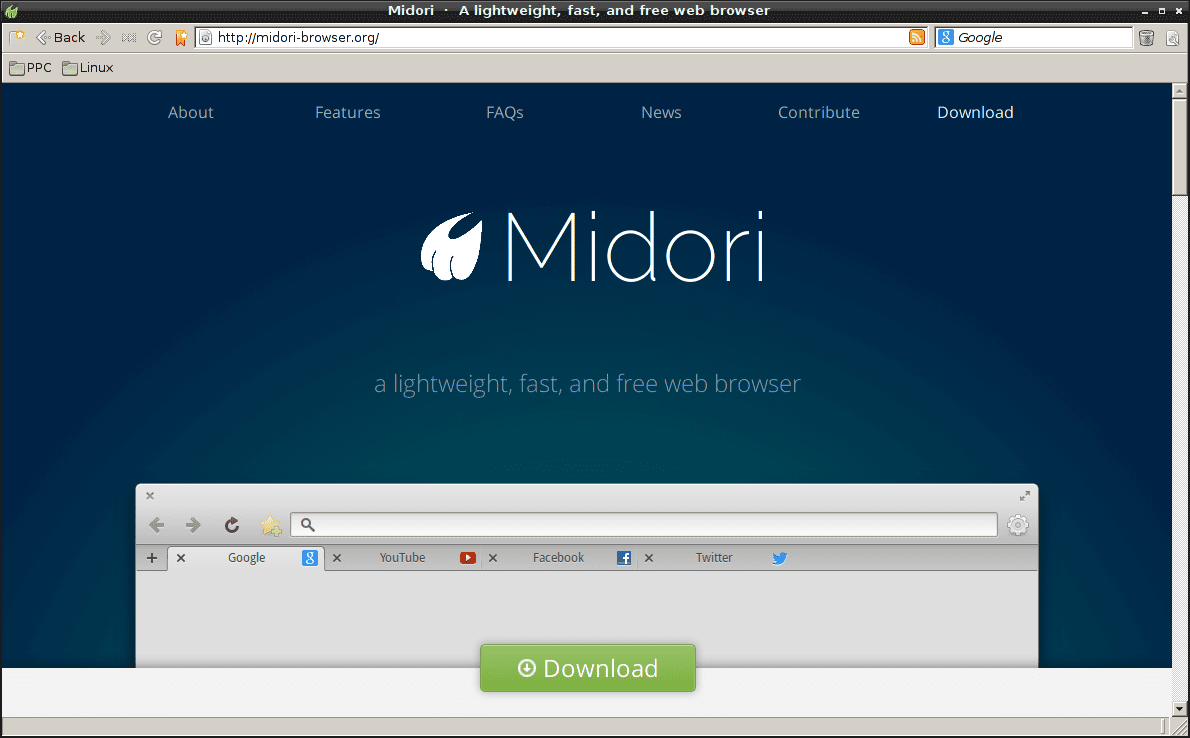
Midori stands out in the Linux browsing landscape as a lightweight and minimalist browser, often considered among the best browsers for Linux due to its simplicity and efficiency. While not as widely known as some counterparts, Midori offers a unique browsing experience tailored for Linux users seeking a streamlined interface and fast performance.
Advantages and Features
This browser's key advantage lies in its lightweight nature, making it an ideal choice for users looking for the best browser for Linux that doesn't compromise system resources. Despite its lightweight build, Midori doesn't sacrifice functionality, offering essential features like tabbed browsing, ad-block capabilities, and customizable extensions. Its sleek and intuitive interface, coupled with its efficient performance, makes it a viable option for users within the Linux ecosystem.
Suitability and User Base
Midori suits users who prefer a minimalist browsing experience without the bells and whistles of more robust browsers. It caters to individuals seeking a fast and straightforward browsing tool within the Linux environment. While it might not offer the extensive feature set of larger browsers, its simplicity appeals to users looking for a reliable, lightweight option, especially on older or less powerful systems.
Accessibility and Integration
Midori's accessibility across various Linux distributions makes it a favorable choice for users exploring the best browser for Linux. Its compatibility and ease of integration within the Linux ecosystem ensure that users can easily install and use it across different systems, providing a consistent and efficient browsing experience.
Midori Browser, with its lightweight design and essential functionalities, presents a compelling option for Linux users looking for a streamlined and resource-efficient browsing experience. While it might not boast the extensive feature set of larger browsers, its simplicity and efficiency make it a standout choice in the diverse landscape of Linux-based browsers
Install Midori on Linux
let's walk through installing Midori on Linux, highlighting its features, advantages, and suitability for Linux users.
To install Midori on your Linux system:
1. Using Terminal:
- Open the terminal.
- Run the command specific to your distribution like sudo apt-get install midori for Debian/Ubuntu or sudo dnf install midori for Fedora.
2. Alternative Methods
- Explore your distribution's software center or package manager to locate and install Midori.
7. Falkon Browser
Falkon emerges as a versatile and lightweight browsing alternative within the Linux ecosystem. Often touted as one of the best browsers for Linux due to its agility and versatility, Falkon presents a unique browsing experience for users seeking a streamlined interface and efficient performance.
Advantages and Features
Falkon's standout advantage lies in its lightweight design, positioning it as the best browser for Linux, especially for users on low-end PCs or those prioritizing resource efficiency. Despite its light footprint, Falkon offers essential browsing features, including tabbed browsing, ad-block capabilities, and an array of customizable extensions. Its clean interface and swift performance contribute to its appeal among users seeking an uncluttered yet functional browsing experience.
Suitability and User Base
Falkon caters to users favoring simplicity and efficiency in their browsing habits within the Linux environment. It particularly appeals to individuals seeking a quick and minimalist browsing tool, making it an excellent choice for low-end systems or older devices where resource consumption is a concern. Its lightweight nature and streamlined functionality make it an optimal browsing option for those valuing speed and simplicity.
Accessibility and Integration
Falkon seamlessly integrates across various Linux distributions, making it accessible to users exploring the best browser for Linux. Its compatibility ensures easy installation and usage across different systems, delivering a consistent browsing experience while conserving system resources.
Falkon Browser, with its lightweight build and essential functionalities, emerges as an attractive choice for Linux users seeking an uncomplicated and resource-efficient browsing experience. Its minimalistic design and efficient performance position it as a noteworthy option in the diverse spectrum of Linux-based browsers.
Install Falkon on Linux
here's a step-by-step guide to installing Falkon on Linux, along with highlighting its features, advantages, and suitability for Linux users:
To install Falkon on your Linux system:
1. Using Terminal:
- Open the terminal.
- Run the command specific to your distribution like sudo apt-get install falkon for Debian/Ubuntu or sudo dnf install falkon for Fedora.
2. Alternative Methods:
- Utilize your distribution's software center or package manager to find and install Falkon.
8. Konqueror
Konqueror, renowned for its versatility and robustness, holds a significant place in the Linux browsing realm. Often acknowledged as one of the best browsers for Linux, Konqueror boasts a rich history and a comprehensive feature set that caters to a diverse range of user needs.
Advantages and Features
The strength of Konqueror lies in its multifaceted nature, offering functionalities beyond traditional browsing. It serves as a file manager, integrating web browsing seamlessly with file management tasks. This versatility positions it as the best browser for Linux, especially for users seeking an all-in-one solution that combines browsing and file management in a single interface. Its feature-rich environment includes tabbed browsing, ad-block capabilities, and support for various web standards.
Suitability and User Base
Konqueror suits users who appreciate a comprehensive tool that transcends conventional browsing. It's ideal for individuals who seek efficiency in managing web and file-related tasks within the Linux ecosystem. Its multi-purpose nature makes it a compelling choice for users valuing versatility and integration in their browsing experience.
Accessibility and Integration
Accessible across various Linux distributions, Konqueror stands as a testament to Linux's adaptability and support for diverse tools. Its integration across systems ensures a consistent browsing and file management experience, providing users with a robust platform for their digital tasks.
Konqueror's legacy as a versatile browser and file manager combo solidifies its position as an intriguing option among the best browsers for Linux. Its ability to seamlessly blend web browsing with file management tasks makes it a unique and powerful tool within the Linux environment.
Install Konqueror on Linux
here's a breakdown of installing Konqueror on Linux, highlighting its features, advantages, and suitability for Linux users:
To install Konqueror on your Linux system:
1. Using Terminal
- Open the terminal.
- Run the command specific to your distribution, like sudo apt-get install konqueror for Debian/Ubuntu or sudo dnf install konqueror for Fedora.
2. Alternative Methods:
- Check your distribution's software center or package manager to locate and install Konqueror.
9. Web (Epiphany) – GNOME Web
GNOME Web, also known as Epiphany, stands as an integral part of the GNOME desktop environment, offering a minimalist yet powerful browsing experience. Considered by many as the best browser for Linux, it exemplifies simplicity and efficiency within the Linux browsing landscape.
Advantages and Features
The strength of GNOME Web lies in its simplicity and integration within the GNOME ecosystem. Recognized as the best browser for Linux, it embraces a clutter-free design and seamless integration with the GNOME desktop environment. Its key features include a minimalist interface, tabbed browsing, intelligent bookmarking, and privacy-enhancing settings, making it a reliable and efficient browsing tool.
Suitability and User Base
GNOME Web suits users seeking an uncluttered browsing experience within the GNOME environment. It caters to individuals who value simplicity and efficiency in their browsing habits, making it an excellent choice for those accustomed to the GNOME ecosystem. Its minimalist approach and integration with GNOME desktop environments make it an appealing option for users seeking a seamless browsing experience.
Accessibility and Integration
Accessible across various Linux distributions that support the GNOME environment, GNOME Web stands as a testament to Linux's adaptability and support for integrated tools. Its compatibility ensures a consistent browsing experience, providing users with a reliable and straightforward platform for their browsing needs.
GNOME Web, celebrated for its simplicity and integration with the GNOME ecosystem, emerges as a preferred choice among the best browsers for Linux. Its clean interface and seamless integration reflect its commitment to providing a streamlined and efficient browsing experience within the Linux realm.
For users who are exploring more Linux commands and tools, understanding how to copy directories in Linux can be incredibly useful. Check out our guide on copying directories in Linux for a step-by-step approach.
10. Pale Moon Browser
Pale Moon emerges as a specialized browsing solution renowned for its emphasis on efficiency and customization. Considered among the best browsers for Linux, Pale Moon offers a unique browsing experience, prioritizing resource efficiency and user customization.
Advantages and Features
The strength of Pale Moon lies in its focus on efficiency and customization, positioning it as the best browser for Linux in many scenarios. Its key features include a customizable interface, robust privacy settings, and compatibility with older hardware, making it an optimal choice for users seeking a tailored and resource-efficient browsing experience.
Suitability and User Base
Pale Moon caters to users who value customization options and efficient resource utilization in their browsing habits. It particularly appeals to individuals seeking a browser optimized for low-end systems or those with older hardware, positioning itself as the best browser for Linux for such users. Its emphasis on efficiency and customizability makes it an appealing choice for those looking for a specialized browsing solution.
Accessibility and Integration
Accessible across various Linux distributions, Pale Moon stands as a testament to Linux's support for diverse browsers. Its compatibility ensures easy installation and usage across different systems, providing users with a consistent browsing experience while conserving system resources.
Pale Moon Browser, with its focus on efficiency and customization, solidifies its position as a compelling option among the best browsers for Linux. Its emphasis on resource efficiency and tailored customization makes it a standout choice in the diverse landscape of Linux-based browsers.
11. Brave Browser
Brave Browser shines as a privacy-centric and swift browsing solution, making a notable mark among the best browsers for Linux. Renowned for its emphasis on privacy, speed, and innovative features, Brave offers users a unique and secure browsing experience.
Advantages and Features
The strength of Brave lies in its focus on user privacy and security, positioning it as one of the best browsers for Linux in terms of safeguarding user data. Its robust privacy settings, including built-in ad-blocking and tracking prevention, ensure a secure browsing environment. Additionally, its speed, owing to its innovative ad-replacement technology, enhances user experience without compromising security.
Suitability and User Base
Brave Browser suits users who prioritize privacy and speed in their browsing habits. It appeals to individuals seeking a secure and fast browsing tool, making it the best browser for Linux for users valuing these features. Its focus on user privacy and its unique approach to advertisement management make it an attractive choice for those keen on protecting their online footprint.
Accessibility and Integration
Accessible across various Linux distributions, Brave Browser stands as a testament to Linux's support for cutting-edge browsers. Its compatibility ensures easy installation and usage across different systems, providing users with a seamless browsing experience while maintaining robust privacy features.
Brave Browser, celebrated for its emphasis on privacy, speed, and innovative ad-blocking technology, solidifies its position as a leading choice among the best browsers for Linux. Its commitment to user privacy and security, coupled with its swift performance, makes it an appealing option in the diverse landscape of Linux-based browsers.
If you're looking to take your Linux experience a step further, consider hosting a website on a Linux VPS to maximize performance and control. Learn how to get started with this powerful hosting solution
12. Waterfox Browser
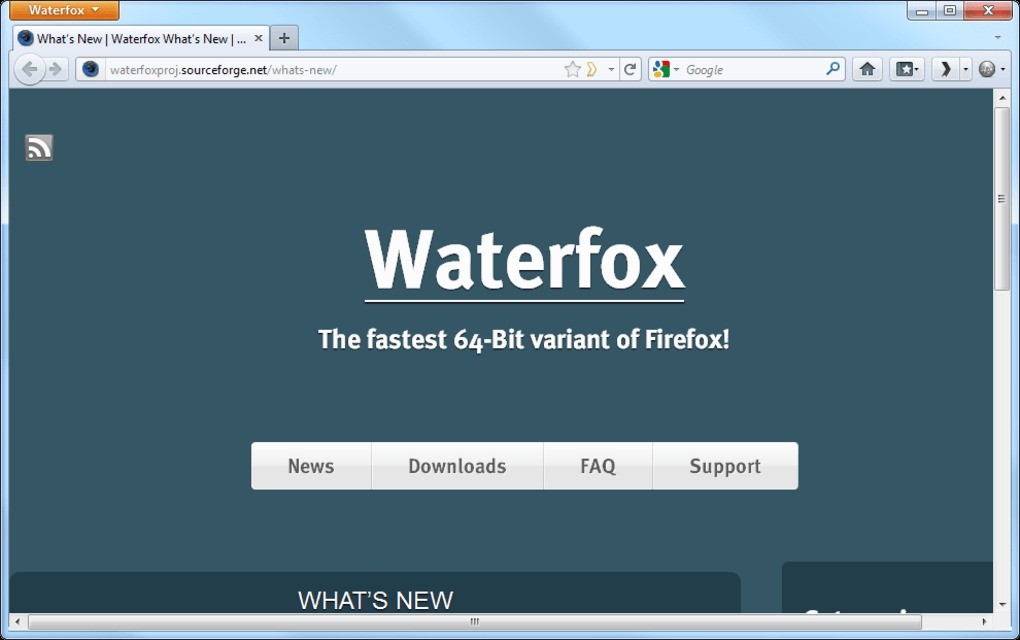
Waterfox Browser emerges as a robust and customizable browsing solution tailored for performance, privacy, and user preferences. Often recognized as one of the best browsers for Linux, Waterfox offers a unique blend of speed and customization options.
Advantages and Features
Waterfox's strength lies in its focus on speed and customization, positioning it as the best browser for Linux in terms of tailoring the browsing experience. Its features include a customizable interface, enhanced privacy settings, and compatibility with older hardware, making it an optimal choice for users seeking a personalized and efficient browsing experience.
Suitability and User Base
Waterfox suits users who appreciate customization options and a high level of control over their browsing environment within the Linux ecosystem. It particularly appeals to individuals seeking a browser optimized for performance and privacy, making it the best browser for Linux for such users. Its emphasis on speed and customization makes it an appealing choice for those looking for a specialized browsing solution.
Accessibility and Integration
Accessible across various Linux distributions, Waterfox stands as a testament to Linux's support for diverse browsers. Its compatibility ensures easy installation and usage across different systems, providing users with a consistent browsing experience while maintaining a high level of privacy and performance.
Waterfox Browser, celebrated for its emphasis on speed, customization, and privacy, solidifies its position as a compelling option among the best browsers for Linux. Its commitment to user control and performance, coupled with robust privacy features, makes it an appealing choice in the diverse landscape of Linux-based browsers.
13. Slimjet Browser
Slimjet Browser stands out as an exceptional browsing solution within the Linux environment, earning its reputation as the best browser for Linux. Renowned for its versatility and robust functionality, Slimjet caters to a wide array of Linux distributions and system configurations, making it an ideal choice for various user preferences and needs.
Versatility Across Linux Distributions
Slimjet isn't just the best browser for Linux Mint or Fedora; its adaptability spans multiple distributions like Debian and suits both 32-bit and Mint 32-bit systems. This broad compatibility ensures seamless performance across diverse Linux setups.
Optimized Resource Utilization and Battery Life
For users craving maximum system efficiency, Slimjet shines as the optimal choice, specifically excelling as the best browser for battery life on Linux. Its streamlined performance on low-end systems, including resource-restricted environments like Linux Lite, makes it highly compelling.
Robust Security and Privacy Features
As the most secure browser for Linux, Slimjet integrates robust measures to safeguard user data, owing to its Chromium-based structure. Its reputation as the safest web browser for Linux ensures an unparalleled level of user privacy.
Developer-Centric Tools and Customization
Catering to developers, Slimjet offers a plethora of tools and customization options, solidifying its status as the best browser for Linux developers. Its adaptability within various Linux distributions amplifies its appeal among the developer community.
Unmatched Speed and Performance
Slimjet isn't solely the fastest browser for Linux; it excels in providing a smooth, lag-free browsing experience. Its exceptional performance consistently earns praise from users across diverse Linux systems.
Extensive Feature Set and Tailored Suitability
With a rich suite of functionalities, Slimjet stands as the best browser app for Linux Mint and is favored by users seeking a well-equipped browser. Its universal appeal caters to various demographics, from casual users seeking an intuitive browsing experience to tech enthusiasts and developers valuing performance and customization.
Slimjet's universal adaptability and feature-rich design make it the best browser for Linux, serving a diverse range of user needs and preferences across different distributions and computing environments. In the vast realm of Linux-compatible browsers, Slimjet emerges as the pinnacle choice, delivering a comprehensive browsing experience tailored to users' specific requirements.
To further enhance your Linux experience, you might also find it useful to learn how to manage user permissions effectively. For instance, if you're looking to remove users in Linux, our guide on how to remove users in Linux provides clear steps to help you maintain control over your system.
14. Min – A Fast, Minimal Browser
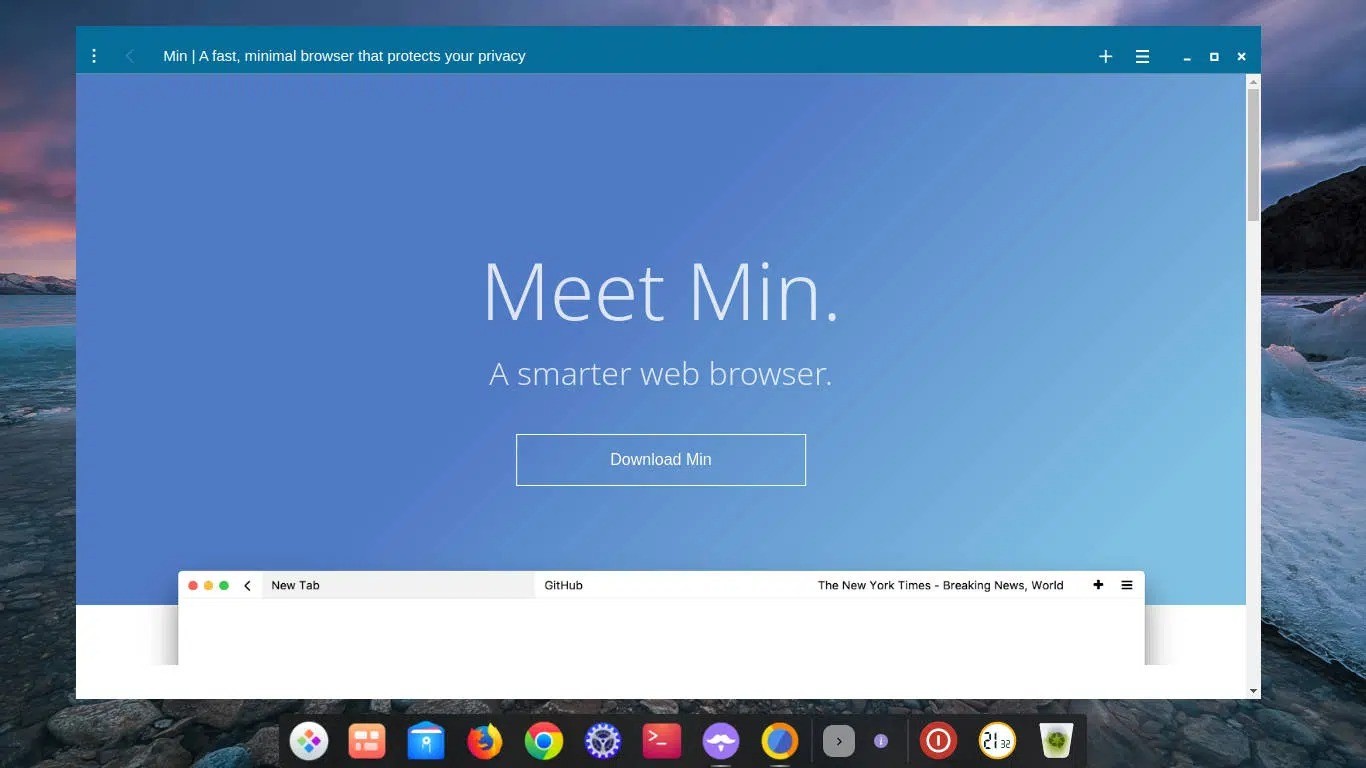
Min Browser is designed with a minimalist philosophy, focusing on speed and simplicity without compromising functionality.
Advantages and Features of Min Browser for Linux:
Minimalist Interface
Min Browser offers a clutter-free interface, keeping distractions to a minimum and maximizing screen space for content.
Speed and Performance
Known for its swift performance, Min Browser ensures quick page loads and responsive browsing experiences.
Resource Efficiency
It's designed to be lightweight, consuming fewer system resources, which is ideal for users with older or lower-spec machines.
Customization Options
Despite its minimalism, Min Browser offers basic customization options to tailor the browsing experience to users' preferences.
Privacy Features
While minimal, Min Browser includes essential privacy features like ad-blocking and tracker prevention.
Suitable Users for Min Browser on Linux:
Min Browser on Linux is suitable for:
- Users Favoring Minimalism
Those who prefer a simple, distraction-free browsing experience.
- Speed Enthusiasts
Users seeking fast and efficient browsing without unnecessary features.
- Resource-Conscious Users
Ideal for those looking for a browser that doesn't strain system resources.
- Privacy-Minded Users
Offering basic privacy features suitable for users concerned about online tracking and ads.
Min Browser's emphasis on minimalism and speed makes it a unique choice among browsers for Linux users. It's particularly suitable for individuals valuing simplicity and efficiency in their browsing experience. However, users requiring extensive customization or a broader range of features might explore alternative browsers based on their specific needs.
15. Tor Browser
In this section we tell you best linux distro for tor browser. The Tor Browser is renowned for its focus on privacy and anonymity, making it a top choice for users seeking heightened security in their browsing experience, especially on Linux. Here's a detailed look at its advantages and suitability:
The Tor Browser is built on the Tor network, emphasizing privacy and anonymity in browsing activities, and is the best browser for developers linux
Advantages and Features of Tor Browser for Linux:
Anonymity and Privacy
Tor routes internet traffic through a series of relays, encrypting it and concealing the user's location and browsing habits.
Enhanced Security
It minimizes the risk of tracking, surveillance, and identity exposure, making it a potent tool for users valuing online privacy.
Access to Onion Sites
The browser allows access to onion sites, hidden services on the Tor network, providing an extra layer of privacy.
Resistant to Fingerprinting
Tor Browser actively combats browser fingerprinting, making it harder for websites to track and identify users.
Suitable Users for Tor Browser on Linux:
The Tor Browser on Linux is suitable for:
- Privacy Advocates
Individuals highly concerned about privacy and anonymity online.
- Journalists and Activists
Those working in sensitive areas where anonymity is crucial.
- Whistleblowers and Dissidents
Individuals who require secure and anonymous communication and browsing.
- General Users
Anyone looking for an extra layer of privacy and anonymity while browsing.
The Tor Browser remains unmatched in providing robust privacy and anonymity features on the internet, making it an excellent choice for Linux users prioritizing online security. However, due to its focus on privacy, users might experience slightly slower browsing speeds compared to conventional browsers. Hence, while Tor is ideal for privacy enthusiasts, users looking for faster browsing experiences might explore other options based on their specific needs.
For users seeking to optimize their Linux experience further, it's important to know how to efficiently locate files on your system. Learn more about finding files in Linux and streamline your workflow.
16. SeaMonkey
SeaMonkey is an all-encompassing internet suite that combines a web browser, email client, HTML editor, and more into a single application.
Advantages and Features of SeaMonkey for Linux:
Integrated Suite
It includes a web browser, email client, newsgroup client, IRC chat, and HTML editing in a unified platform, providing convenience for users who prefer an all-in-one solution.
Familiar Interface
For those accustomed to older internet suites like Netscape, SeaMonkey maintains a similar look and feel.
Customization Options
SeaMonkey offers customization through themes and extensions, allowing users to personalize their browsing experience.
Tabbed Browsing and Security
It supports tabbed browsing and includes security features to protect against malware and phishing attempts.
Suitable Users for SeaMonkey on Linux:
SeaMonkey on Linux is suitable for:
- Users Preferring All-in-One Solutions
Individuals seeking a single suite for internet browsing, emailing, and other web-related tasks.
- Fans of Traditional Internet Suites
Those familiar with older suites like Netscape and looking for a similar user experience.
- Users Valuing Convenience
People who appreciate having multiple internet tools integrated into one application for streamlined use.
SeaMonkey stands as an intriguing choice for Linux users seeking a comprehensive suite for their internet activities. Its integration of various tools into a single platform offers convenience, making it suitable for individuals preferring an all-in-one internet solution. However, users who require specialized features or modern browsing experiences might explore other browsers that cater specifically to their needs.
Conclusion
In the vast landscape of browsing options for Linux users, finding the best browser for Linux involves exploring an array of exceptional choices. Each browser brings its own strengths and unique features to the table, catering to diverse preferences and priorities. Whether it's privacy-focused browsing, extensive customization, or seamless performance, the best browser for Linux truly depends on individual needs and preferences.
Moreover, if you're looking for a powerful and secure browsing experience, consider pairing your Linux setup with a reliable Linux dedicated server for enhanced performance and privacy.
Firefox stands tall among the contenders, recognized for its privacy-centric approach, robust customization, and an extensive library of extensions. It earns its place as a top choice for those valuing privacy and seeking a browsing experience tailored to their preferences. Meanwhile, Google Chrome, based on Chromium, continues to shine with its seamless synchronization, vast extension support, and strong overall performance, making it a go-to option for users requiring synchronization across multiple devices.
Brave Browser emerges as a trailblazer in the realm of privacy, emphasizing security by default with its ad and tracker blocking features. Its rewards system further distinguishes it as a suitable choice for those placing a premium on online privacy. Opera, with its built-in ad-blocker, VPN, and customizable interface, offers a convenient browsing experience, making it an attractive option for users valuing integrated features. Vivaldi, known for its extensive customization and productivity tools, caters to users seeking a highly personalized browsing environment. Lastly, the Tor Browser prioritizes anonymity and privacy, ensuring heightened security for those who highly prioritize online anonymity. Ultimately, the best browser for Linux is a personal choice, shaped by individual needs and preferences, in a landscape rich with excellent options catering to a myriad of user requirements.To buy a VPS, you can visit the Buy Linux VPS page.










